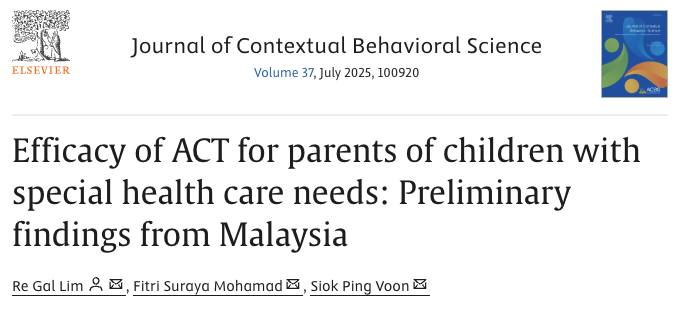Journal of Contextual Behavioral Science (JCBS)
Volume 37, July 2025
Authors
Re Gal Lim, Fitri Suraya Mohamad, & Siok Ping Voon
Key Findings
• Linguistic and cultural adaptations integrated into the My-CARE protocol.
• Significantly improved depression, stress, PF and QoL in the intervention group over time.
• Significantly improved depression, anxiety, stress, PI, PSI and QoL between groups over time.
Abstract
Parents of children with special health care needs (CSHCN) often experience heightened stress and psychological distress, which not only affects parental well-being but also has cascading effects on their children. Despite the importance of supporting parental psychological health, interventions addressing their well-being remain underexplored, particularly in Malaysia. Culturally adapted interventions for these parents in the Malaysian context are especially scarce. The present study addressed this gap by evaluating the My-CARE protocol, a culturally adapted intervention targeting Chinese Malaysian parents of CSHCN in Kuching, Sarawak, Malaysia. Its preliminary efficacy was evaluated through a quasi-experimental study involving two groups (intervention and control; n = 31 per group) across three time points: baseline, post-intervention, and one-month follow-up. Linear Mixed Model analysis indicated significant time effects on depression, stress, psychological flexibility, and quality of life. Additionally, significant Group × Time interactions were identified for depression, anxiety, stress, psychological inflexibility, parenting stress, and quality of life, demonstrating significant differential changes between groups over time. These findings offer preliminary evidence regarding the potential efficacy of an ACT-based, parent-focused group intervention targeting Chinese Malaysian parents of CSHCN. This study contributes to the emerging literature on the potential value of culturally adapted ACT interventions for this population.
